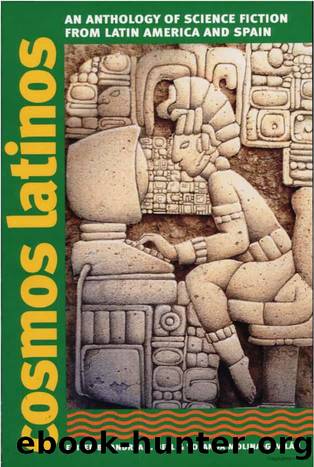Cosmos Latinos: An Anthology of Science Fiction From Latin America and Spain by Bell Andrea L. & Molina-Gavilan Yolanda

Author:Bell, Andrea L. & Molina-Gavilan, Yolanda [Bell, Andrea L. & Molina-Gavilan, Yolanda]
Language: eng
Format: epub
Tags: Science Fiction, Anthology
Publisher: Wesleyan University Press
Published: 2003-07-31T04:00:00+00:00
André Carneiro
BRAZIL
Considered one of the founding fathers of Brazilian science fiction, André Carneiro (1922-) was born and educated in the small town of Atibaia, outside of Sao Paulo. In spite of his stature within the SF community, cultivating the genre has been but one of his many interests, albeit a much-loved one. His adult life has always been intimately associated with the arts, and in Brazil he is a wellknown experimental filmmaker, painter, photographer, and writer. One of his films. Solitude (Solidäo), was selected to represent Brazil in the Tenth International Film Festival in Glasgow, Scotland, in 1951, and he has received several awards over the years for his photographic and literary work. As a mainstream author, Carneiro is best known for his poetry (see his collection Fuilspace: André Carneiroâs Poems: 1958-1963 [Espaçopleno: Poemas de André Carneiro 19581963,1966]) and for his novels of psychosocial criticism, written in a style that has been compared to Aldous Huxleyâs.
As an SF author, Carneiro is celebrated for his essay âIntroduction to the Study of Science Fictionâ (âIntroduçâo ao estudo da âscience-fiction,ââ 1967), for the novel Free Swimming Pool {Piscina livre, 1980) and its sequel The Art of Love {Amorquia, 1991), and for the short story collections Diary of the Lost Spaceship {Diario da nave perdida, 1963) and The Man Who Guessed Right (0 homem que adivinhava, 1966). His short novel Darkness {A escuridâo), which first appeared in Diario da nave perdida, is an end-of-the world story where only blind people are able to cope on an Earth suddenly devoid of light. It is considered an international classic of SF, having won the Brazilian Hugo, that is, the Nova science fiction award for best short fiction of 1995 (in a reprint). Carneiroâs stories have been translated into Spanish, English, Japanese, French, Italian, and German.
Carneiro has always requested that his science fiction be judged as literature, and in fact feels that the designation âscience fictionâ has done tremendous harm because it isolates writers and stigmatizes their work. Be that as it may, he is much celebrated among Brazilâs SF fandom, where his highly original short stories and novels are kept alive.
The story we choose to present here, âBrain Transplant,â was initially written for the Brazilian edition of Playboy, but was rejected by the editors. It was first published in Argentina by Distar in 1978 as part of an anthology that featured stories by Brian Aldiss, Fritz Leiber, and Damon Knight, among other international SF authors. The story was later featured in a collection of Carneiroâs SF stories: âHieronymusâs Machine and Other Storiesâ (A máquina de Hyerónimus e outras historias, 1997). âBrain Transplantâ presents a world in which technology allows for the sensory perception of another human beingâs thoughts. This possibility, besides erasing old signs of identity like gender and family relations, ends up blurring reality itself to the point of being unrecognizable. The storyâs conclusion proposes (as an antidote to political propaganda?) that the only way to discern between reality and illusion is to rely on oneâs own physical senses of sight, sound, and touch.
Download
This site does not store any files on its server. We only index and link to content provided by other sites. Please contact the content providers to delete copyright contents if any and email us, we'll remove relevant links or contents immediately.
The Tidewater Tales by John Barth(12659)
Kathy Andrews Collection by Kathy Andrews(11834)
Tell Tale: Stories by Jeffrey Archer(9038)
This Is How You Lose Her by Junot Diaz(6887)
The Mistress Wife by Lynne Graham(6491)
The Last Wish (The Witcher Book 1) by Andrzej Sapkowski(5468)
Dancing After Hours by Andre Dubus(5280)
The Sympathizer by Viet Thanh Nguyen(4390)
Be in a Treehouse by Pete Nelson(4051)
The Secret Wife by Lynne Graham(3925)
Maps In A Mirror by Orson Scott Card(3902)
Tangled by Emma Chase(3760)
Ficciones by Jorge Luis Borges(3636)
The House on Mango Street by Sandra Cisneros(3472)
A Knight of the Seven Kingdoms by George R R Martin(3371)
Girls Who Bite by Delilah Devlin(3257)
You Lost Him at Hello by Jess McCann(3074)
MatchUp by Lee Child(2883)
Once Upon a Wedding by Kait Nolan(2795)
